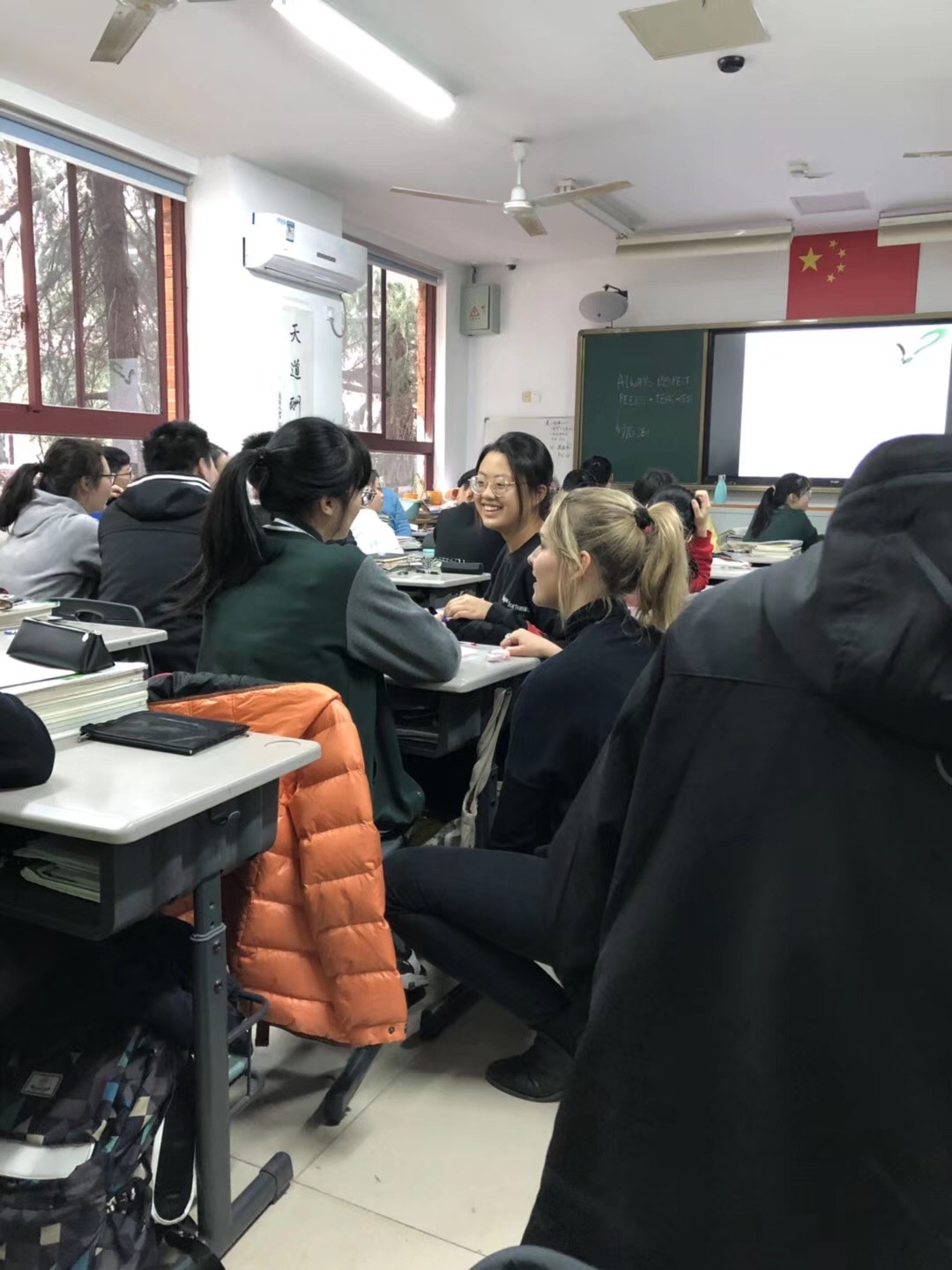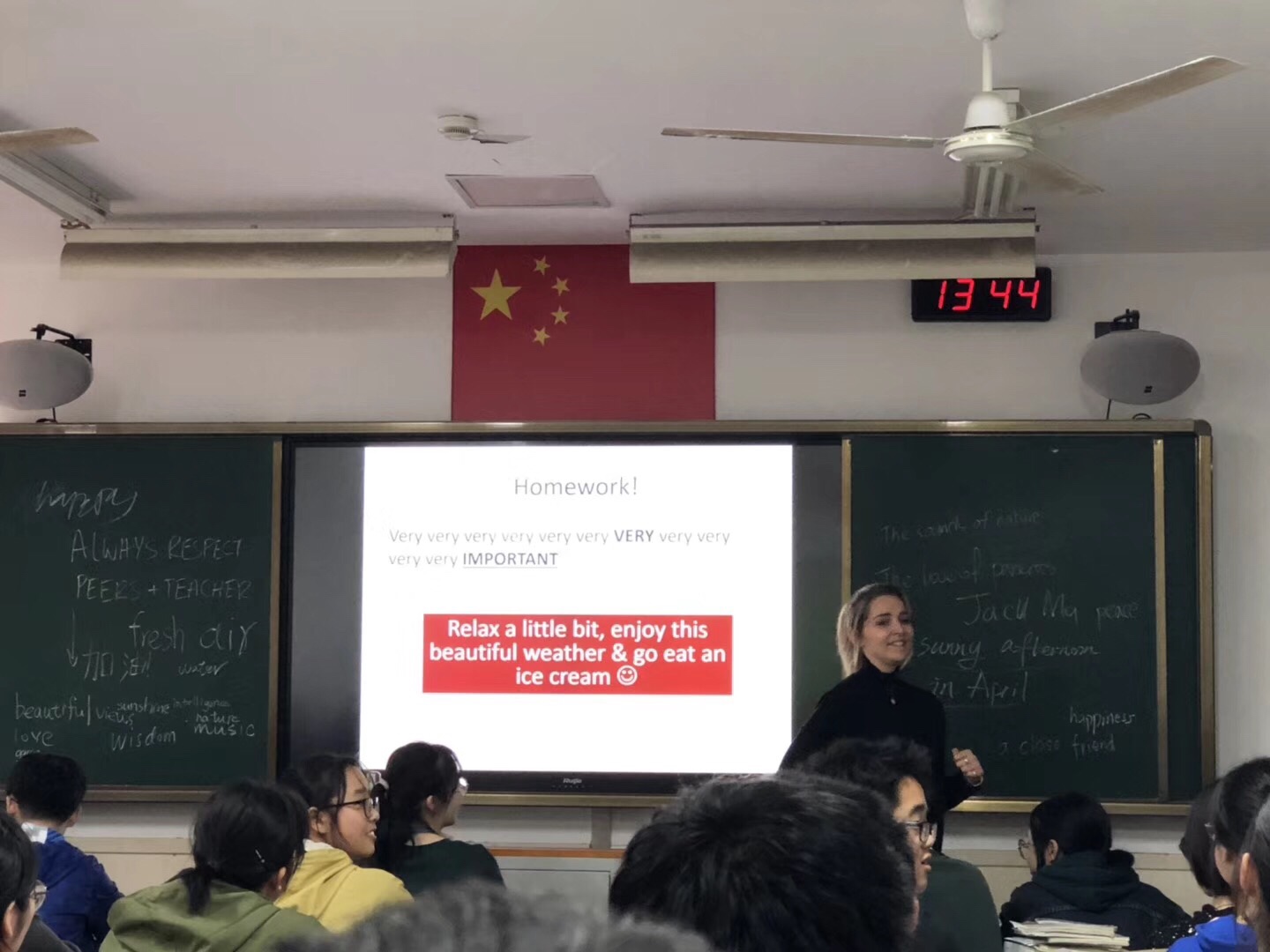By Natasha Lock, State school teacher in Suzhou, 2019 – present
“How is teaching? Do you enjoy it?”
Teaching students in China feels like a real privilege. Whilst I am employed to teach the students, I also learn a great deal from them. Leaving school everyday after work and knowing that I’ve made a direct difference to someone’s day is extremely fulfilling and rewarding. Teaching certainly builds confidence and character. Standing in front of 50/60 teenagers for 4 hours each day demands lots of energy, organization and drive. In China, it goes far beyond teaching them information, also building the students’ confidence in their oral English, their ability to debate concepts and opening their minds to the world outside of China. During my role as a teacher, I’ve really tried to show the students a different style of teaching method than their usual ‘lecture-style’, teacher at the front talking to them, learning. I try to pursue discussion based learning, study topics that require the students to ‘think outside the box’ and do not set my students homework.
I am also using my teaching experience in China to develop my Mandarin and fulfill my travel desires. As a teacher, you actually get a lot of free time. There are breaks between lessons and I never work later than 5pm. This leaves a lot of time to study Mandarin, go out with friends and on the weekends and numerous national holidays, travel within China.
“How do you live in China? Isn’t it really different?!”
 Life in China is a real rollercoaster. There is highs and lows, love for the country and a lack of patience for it, enjoyment and shock. With China, you have got to just embrace it for what it is – I often joke that if you don’t laugh at things, you will cry! Yes it is different; but that is exactly makes it such a unique and special country. The China life is crazy from when you first touch down here. Things are very different to back home, but if you are constantly comparing the two or questioning why things are done so differently here, you will end up wasting a lot of energy!
Life in China is a real rollercoaster. There is highs and lows, love for the country and a lack of patience for it, enjoyment and shock. With China, you have got to just embrace it for what it is – I often joke that if you don’t laugh at things, you will cry! Yes it is different; but that is exactly makes it such a unique and special country. The China life is crazy from when you first touch down here. Things are very different to back home, but if you are constantly comparing the two or questioning why things are done so differently here, you will end up wasting a lot of energy!
Life in China surprisingly becomes quite ‘normal’ quite quickly. Living here is actually much easier than some may expect. I feel my day-to-day life routine was fixed in about the second week of teaching. I get a bus to school in the mornings, spend the day teaching, maybe go for a run, have dinner and see friends. There is easy access to many normal ‘homely’ things: coffee, shops and places to exercise. Sometimes I forget that I am on the other side of the world; but there are daily reminders. The beeping horns, the endless scooters, the street vendor cooking pancakes… the list goes on!
“How on earth do you manage class sizes of 40-60 students?!”
Probably the most frequently asked questions from my friends back home. The class sizes in China are extremely different to back in the UK. You have 40-60 students in each class, each sat on individual desks facing the front.
Chinese students are, on the whole, extremely well behaved in classes and have a natural respect for their teachers. My goal is to make sure each student speaks in my classes, as I regard building their oral English as my priority. To do this, I have a name list and when I ask questions work through this list. Moreover, if there is a reading passage in my powerpoint, I make each row stand up to read part of the extract. If you ask the whole class to read something, many will get lost in the crowd, so asking row by row works much better.
Winning the respect of your students is key to controlling your classes. Managing classes of this size really relies on your students building respect for you. Keep your rules short and simple. My 2 class rules, that I write on the blackboard at the start of every lesson, are:
- Always respect peers and teacher
- 加油 (A Chinese saying meaning go go go! Try your best!)
I write the rules up every class for a couple of reasons. The first is so I am consistent with what I expect from them. On the whole, if the kids are respecting (covering a wide range of things) each other and me, the classes will go well. This includes: listening to others, not talking when others are, respecting the viewpoint of others and listening when I am speaking. The second rule, meaning add fuel, is requesting the energy of the students in my classes. If the kids are trying their best, the classes will go well.
The second reason that I do this is for backup. If there are any problems, then I can address the student in the wrongdoing and ask them if they understand the two rules, and if so why they aren’t complying with them. This seems a much calmer way to address any in-class problems than shouting or telling the student off.
The only real problem I have is the students doing homework from other classes in my lessons. In a way I feel bad about this, because I know how much daily homework my students receive and they are just trying to get it done. However, it is distracting to their English learning if they are doing physics or maths in my lesson, so I take the book away and tell them they can collect it at the end of classes.
“How do you think up new lesson plans each week?”
 Granted this one can sometimes be tough! But I take my inspiration from what’s around me: what is going on in the news, what I notice the students find culturally different about England and China, what I wish for them to know more about, what I feel their current education lacks in teaching them, or simply asking them what they’d like to learn about. I teach 16 year olds and their English is of a very good level. I have done lessons on: population, the Olympics, Shakespeare, stereotypes, the use of plastic straws and their environmental implications, how health is more important than wealth and on being a Good Samaritan.
Granted this one can sometimes be tough! But I take my inspiration from what’s around me: what is going on in the news, what I notice the students find culturally different about England and China, what I wish for them to know more about, what I feel their current education lacks in teaching them, or simply asking them what they’d like to learn about. I teach 16 year olds and their English is of a very good level. I have done lessons on: population, the Olympics, Shakespeare, stereotypes, the use of plastic straws and their environmental implications, how health is more important than wealth and on being a Good Samaritan.
There are a huge amount of resources to use. Firstly, the TEIC website gives you full access to lesson plans. Other courses I use: my housemates who are also teachers at different schools, other teachers in your city and of course google. I often make my own classes and then use inspiration from others’ to improve what I have already made. If I have a topic that I want to do a lesson on, I will often google the topic and add ESL lesson to the end. For example, ‘population ESL lesson’. I do this more to gain some inspiration for activities for my own presentations.
“Don’t you get tired?”
With any job you are bound to feel tired now and again. However, teaching is different to a desk job – you are always on show and 60 people are constantly relying on your energy. Your energy will determine the energy of the students. I have 6:30am starts most mornings to be at school for the first class. Unsurprisingly, making sure you have a good sleep pattern, good diet and healthy lifestyle all help to combat tiredness. I also really try to keep my Sundays as a day to relax a little, go for a run and read a book with a coffee.
As you are living in a new and foreign country, you may feel some pressure to ‘make the most of every moment’ and use your weekends to the full. Whilst weekends are definitely a great time to explore other areas and cities in China, you must remember to maintain some balance to make sure you are not overdoing it. There are many national holidays in China and a long summer and winter vacation – these you can use to fully embrace all of the incredible travels to be done in China.
Are you up for the challenge? Find out more about our Teaching Programme and take your first steps towards living and working in China.


Leave A Comment
You must be logged in to post a comment.